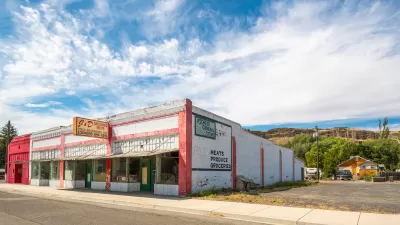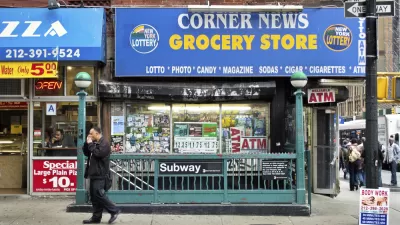An estimated 500,000 residents of the Atlanta area live without access to grocery stores. A recent article asks the obvious question: “Why can we build multimillion-dollar highway systems and multibillion-dollar stadiums but not more grocery stores?"
“Indeed, more than half a million people in the city of Atlanta and the ten counties that surround it live in neighborhoods the U.S. Department of Agriculture classifies as food deserts,” writes Rebecca Burns in a thoughtful and broad examination of the food desert problem in Atlanta and its surrounding suburbs.
Perhaps surprisingly, food deserts expand well into the suburban surroundings of Atlanta: “You don’t find these nutritional wastelands only in places like Bankhead; it’s even harder to get fresh, healthy food in the suburbs. In Cobb County, 75,000 people are food desert residents, as are 124,000 in Clayton.”
Moreover, “Getting fresh food isn’t only a problem for the poorest Atlantans. Areas most of us would hardly consider underprivileged—the middle-class suburbs of DeKalb County or the gentrified enclaves around Grant Park, for instance—are labeled 'low access' by the USDA, meaning at least a third of the people who live there have to travel a mile or more to get to a grocery store.”
FULL STORY: Stranded in Atlanta's Food Deserts

Planetizen Federal Action Tracker
A weekly monitor of how Trump’s orders and actions are impacting planners and planning in America.

Maui's Vacation Rental Debate Turns Ugly
Verbal attacks, misinformation campaigns and fistfights plague a high-stakes debate to convert thousands of vacation rentals into long-term housing.

San Francisco Suspends Traffic Calming Amidst Record Deaths
Citing “a challenging fiscal landscape,” the city will cease the program on the heels of 42 traffic deaths, including 24 pedestrians.

Amtrak Rolls Out New Orleans to Alabama “Mardi Gras” Train
The new service will operate morning and evening departures between Mobile and New Orleans.

The Subversive Car-Free Guide to Trump's Great American Road Trip
Car-free ways to access Chicagoland’s best tourist attractions.

San Antonio and Austin are Fusing Into one Massive Megaregion
The region spanning the two central Texas cities is growing fast, posing challenges for local infrastructure and water supplies.
Urban Design for Planners 1: Software Tools
This six-course series explores essential urban design concepts using open source software and equips planners with the tools they need to participate fully in the urban design process.
Planning for Universal Design
Learn the tools for implementing Universal Design in planning regulations.
Heyer Gruel & Associates PA
JM Goldson LLC
Custer County Colorado
City of Camden Redevelopment Agency
City of Astoria
Transportation Research & Education Center (TREC) at Portland State University
Jefferson Parish Government
Camden Redevelopment Agency
City of Claremont





























